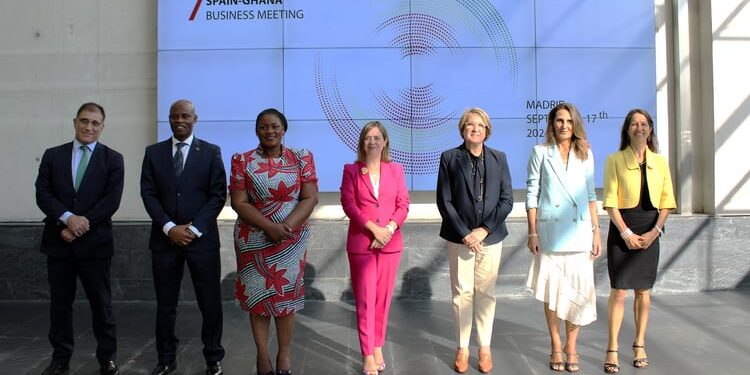The Diplomat
Ghana’s Deputy Minister of Commerce and Industry, Nana Ama Dokua Asiamah-Adjei, has highlighted the significant role of Spanish companies in the transfer of knowledge and the growth of Ghana, through their investments in the IT, manufacturing and infrastructure sectors, as well as their support for the digitalisation and internationalisation of the country.
Nana Ama Dokua Asiamah-Adjei headed the institutional and business delegation that participated in the Spain-Ghana business meeting organised by the Spanish Chamber of Commerce, together with the Secretary of State for Commerce through ICEX Spain Export and Investments, and CEOE, and recalled that “Ghana has become Spain’s first commercial partner in West Africa”. She also stated that her country is one of the most stable democracies in the region, and highlighted the efforts of her government to “correct vulnerabilities” and “promote a favourable climate for businesses and sustainable investment,” according to a note from the Spanish Chamber of Commerce.
The State Secretary for Trade, Amparo López Senovilla, agreed in stressing that “Ghana is an ally country for Spanish investments in the West African region, as evidenced by the presence in the country of more than twenty Spanish companies with a long-term commitment.” She also highlighted that “Africa is a region of special interest for Spain, both due to its geographical proximity and its cultural and economic ties.
“It is necessary – she stated – to strengthen our economic and commercial cooperation with a joint strategic framework, to promote initiatives that allow us to advance together towards more robust, sustainable and fair growth. For this reason, we have recently launched the ‘Africa Advances Alliance’, a project aimed at promoting sustainable growth in West Africa and increasing opportunities for the African population. The objective is to identify and launch investment projects by Spanish companies in sectors with high productive potential, job creation or innovation, such as telecommunications, finance, agriculture, tourism or infrastructure.”
For her part, the director of the Spanish Chamber, Inmaculada Riera, also cited “the appropriate policies carried out by the Government of Ghana” that successfully address “some imbalances.” For Inmaculada Riera, “our bilateral trade and investment relations are at a fairly good level, and there is still room for improvement.” Riera assured the capacity and willingness of Spanish companies to play an important role in sectors that are very relevant to the productive diversification and competitiveness of Ghana, such as agri-food, renewable energy, transport and water infrastructure, processing industries, health, tourism or new technologies. “In Spain, Chambers of Commerce and business organisations work to help our companies face the challenge of building a greater presence in Africa, through economically and socially sustainable investments,” she said.
The president of the CEOE International Relations Commission, Marta Blanco, highlighted the role of business organisations in facilitating bilateral economic relations between Spain and Ghana. In this regard, CEOE works with the Ghana Employers’ Association (GEA) within the framework of the International Organisation of Employers (IOE). She also highlighted the great economic potential of Ghana, which is positioned as one of the main investment destinations in Africa. This is possible due to the actions that the Government of Ghana has carried out to diversify and boost the economy, such as the Economic Partnership Agreement with the European Union or the establishment of the Secretariat of the African Continental Free Trade Area (AfCFTA). She also stressed that, for Spanish companies, it would also be essential to implement bilateral agreements to avoid double taxation and reciprocal protection of investments. Finally, she encouraged us to work together to continue strengthening our relations and continue to overcome difficulties.
The European Union is an important trading partner of Ghana, and the Economic Partnership Agreement (EPA) currently in force between the EU and Ghana is expected to promote bilateral trade flows. Ghana already enjoys full freedom to export products to the EU without tax, while since 2021 the gradual liberalisation of 78% of bilateral EU-Ghana merchandise trade has begun until 2029.







